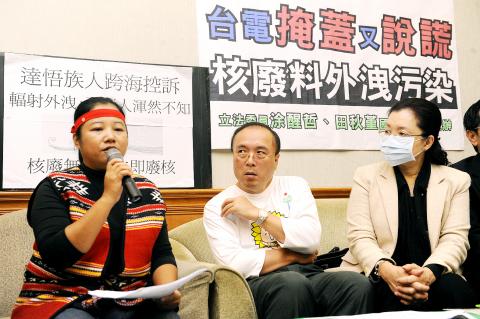Tests have revealed signs of a possible leakage of radioactive materials from an interim nuclear waste repository on Orchid Island (蘭嶼), legislators and environmentalists told a press conference yesterday.
The Chinese-language Liberty Times (the Taipei Times’ sister newspaper) has reported that Taiwan Power Co (Taipower) had commissioned Huh Chih-an (扈治安), a research fellow at the Institute of Earth Sciences at Academia Sinica, to conduct an ecological survey near the repository.
Huh’s study showed there was a leakage of cobalt-60 and cesium-137 at the site, the newspaper said.

Photo: George Tsorng, Taipei Times
State-owned Taipower, which operates the nation’s nuclear power plants, said the radiation levels near the repository did not exceed legal standards and that the small amount measured could be radioactive dust resulting from the inspection and repackaging of the radioactive waste that began four years ago and has since been completed.
Democratic Progressive Party Legislator Twu Shiing-jer (涂醒哲) said Taipower was hiding the truth from the public and did not provide the report when he asked for it.
Peter Chang (張武修), a professor at the School of Public Health in Taipei, said leakage may have been happening for many years. Chang said he had conducted tests in 1999 and 2000 on samples taken from along the shore and crop fields on Orchid Island and found cesium-137 in sweet potato fields and taro paddy fields.
He asked why radioactive monitoring reports by the Atomic Energy Council showed increasing amounts of cesium-137 in the past three years, from an average of below 10 Becquerel per kilogram (Bq/kg) in the past to above 30Bq/kg now.
The amount of cesium-137 recorded in Huh’s report was 32.9Bq/kg
The director of Taipower’s nuclear waste management department, Lee Chin-shan (李清山), said there were no radioactive leakage problems at the repository and that the small amount found in the study could indicate a small amount of radioactive dust from inspections and repackaging operations, but the amount is much lower than the safety standards.
He also said cesium-137 tends to accumulate underground, adding that the safety limit for cesium-137 in bottom mud is 740Bq/kg.
However, Chang said Huh’s test samples were taken from surface mud on the shore near the repository.
Sinam Mafefu, a Tao Aborigine from Orchid Island, said Aborigines there had been misled for decades into believing that if they did not accept the storage of nuclear waste on the island, they would not be able to afford electricity or be taken care of by the government.
“What have residents of Orchid Island done wrong to deserve the fate of having nuclear waste stored on the island and living in fear for the past 30 years?” she asked, adding that cancer was the No. 1 cause of death on the island.
Holding a picture of barrels of spent nuclear fuel at the repository, Green Party Taiwan spokesperson Pan Han-shen (潘翰聲) said that when the repository was being built, residents were told it was a fish canning factory, which is clearly a case of injustice to the people on the island.
Chang said the government should commission a thorough examination of radioactive contamination over the whole island, especially where people live, to prevent any potential radiation from harming residents’ health.

An essay competition jointly organized by a local writing society and a publisher affiliated with the Chinese Communist Party (CCP) might have contravened the Act Governing Relations Between the People of the Taiwan Area and the Mainland Area (臺灣地區與大陸地區人民關係條例), the Mainland Affairs Council (MAC) said on Thursday. “In this case, the partner organization is clearly an agency under the CCP’s Fujian Provincial Committee,” MAC Deputy Minister and spokesperson Liang Wen-chieh (梁文傑) said at a news briefing in Taipei. “It also involves bringing Taiwanese students to China with all-expenses-paid arrangements to attend award ceremonies and camps,” Liang said. Those two “characteristics” are typically sufficient

A magnitude 5.9 earthquake that struck about 33km off the coast of Hualien City was the "main shock" in a series of quakes in the area, with aftershocks expected over the next three days, the Central Weather Administration (CWA) said yesterday. Prior to the magnitude 5.9 quake shaking most of Taiwan at 6:53pm yesterday, six other earthquakes stronger than a magnitude of 4, starting with a magnitude 5.5 quake at 6:09pm, occurred in the area. CWA Seismological Center Director Wu Chien-fu (吳健富) confirmed that the quakes were all part of the same series and that the magnitude 5.5 temblor was

The brilliant blue waters, thick foliage and bucolic atmosphere on this seemingly idyllic archipelago deep in the Pacific Ocean belie the key role it now plays in a titanic geopolitical struggle. Palau is again on the front line as China, and the US and its allies prepare their forces in an intensifying contest for control over the Asia-Pacific region. The democratic nation of just 17,000 people hosts US-controlled airstrips and soon-to-be-completed radar installations that the US military describes as “critical” to monitoring vast swathes of water and airspace. It is also a key piece of the second island chain, a string of

The Central Weather Administration has issued a heat alert for southeastern Taiwan, warning of temperatures as high as 36°C today, while alerting some coastal areas of strong winds later in the day. Kaohsiung’s Neimen District (內門) and Pingtung County’s Neipu Township (內埔) are under an orange heat alert, which warns of temperatures as high as 36°C for three consecutive days, the CWA said, citing southwest winds. The heat would also extend to Tainan’s Nansi (楠西) and Yujing (玉井) districts, as well as Pingtung’s Gaoshu (高樹), Yanpu (鹽埔) and Majia (瑪家) townships, it said, forecasting highs of up to 36°C in those areas